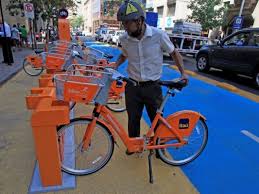| Bicitaxis await passengers near Los Martires Plaza. |
The pedicabs carry out an important service, carrying commuters short distances from places like
| A row of pedicabs in Los Martires. |
Yes, even outside the law, the cabs represent income for thousands of people and perform a valuable service for commuters.
But the legalization of the pedicabs has long been opposed by the taxi lobby, which considers them competition.
Pedicab drivers complain that police sometimes stop them from working and even confiscate their cabs.
Legalizing the cabs and formalizing their work is a good idea - but should be done gradually and carefully. After all, these people work outside the law for a reason: they don't want to bother with rules and regulations. Also, the bicitaxi drivers are generally poor, unsophisticated men, who won't find it easy conforming to bureaucratic standards, even if they try to. They will need support, and probably subsidies, to conform to the law.
The city wants all pedicabs to follow routes and use designated parking areas; they are also to carry insurance, submit to periodic safety checks, have a driver's license and belong to a pedicab company. In addition, the law prohibits gasoline-powered pedicabs, which have become common in recent years. The vehicles must be either pedal or electric-powered.
Will the great majority of the pedicabers decide that becoming legal is less of a burden than continuing to battle the police? Only time will tell. But if they do not, then the city will find itself back where it started.
By Mike Ceaser, of Bogotá Bike Tours
